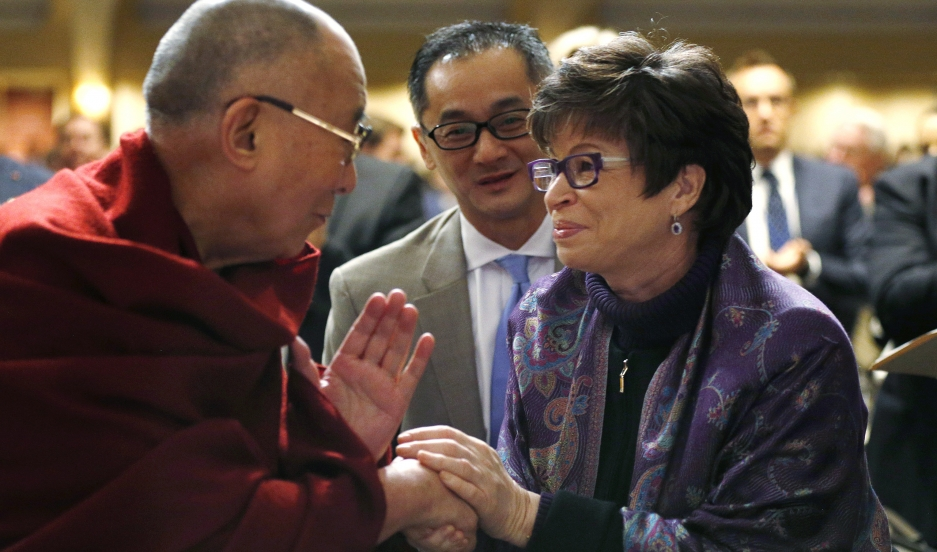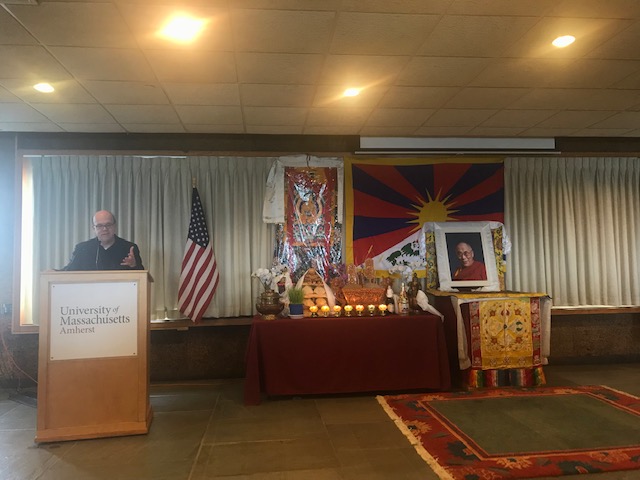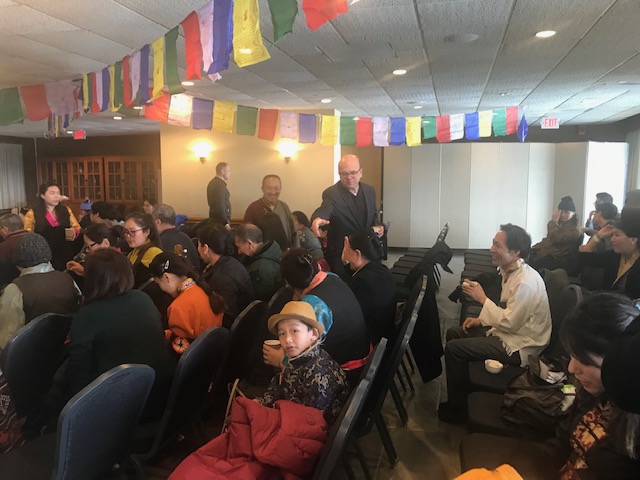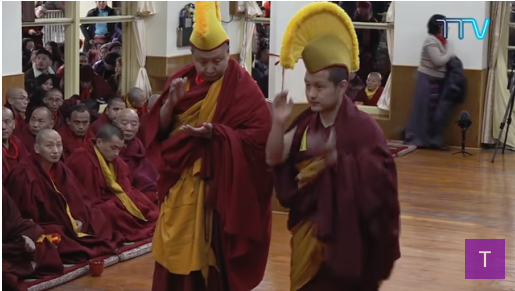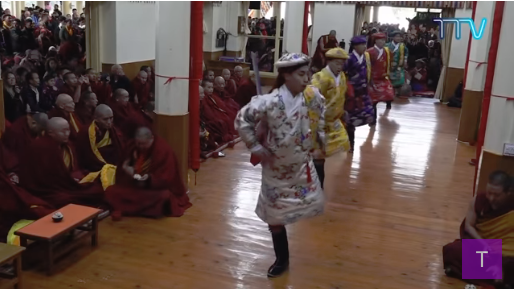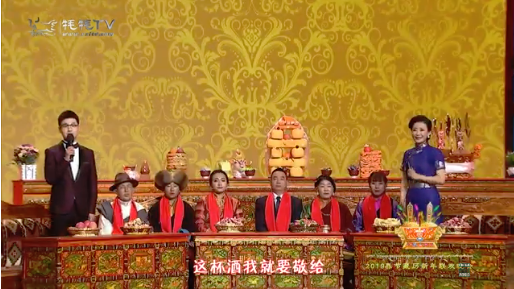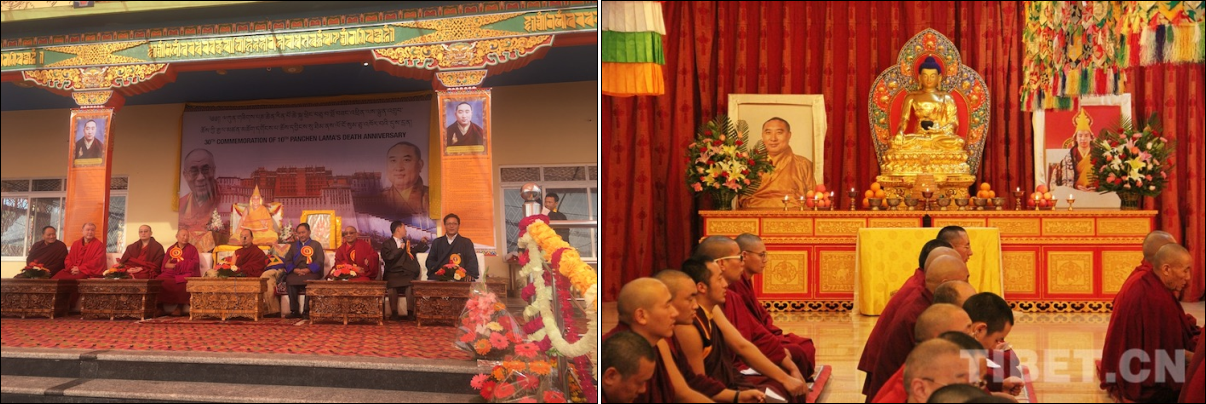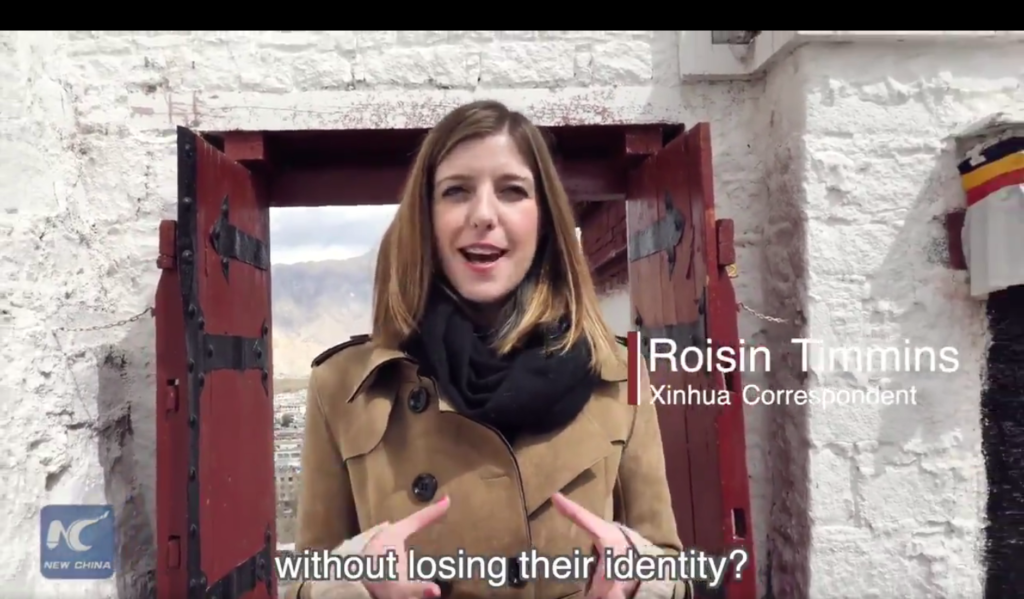
Roisin Timmins, an English-speaking correspondent for Chinese state media, was blasted on social media for filing a mendacious video report from Chinese-occupied Tibet.
If you’re Roisin Timmins, you get exclusive access to Tibet, one of the world’s most geographically and politically secluded countries, which is currently in the stranglehold of China’s stringent isolation policies.
Having brutally occupied Tibet since 1959, China now has the region on complete lockdown. A recent report from the US State Department says the Chinese government “systematically impeded travel to the Tibet Autonomous Region (TAR) and Tibetan areas outside the TAR for US diplomats and officials, journalists, and tourists in 2018.”
No doubt the same was true for citizens of other countries—except Chinese citizens, who increasingly make tourist trips to Tibet, where they are presented with a Disneyland version of Tibetan culture and history.
The situation is worst of all for Tibetan exiles, including thousands of Tibetan American citizens, who are cruelly denied the right to visit their ancestral land. Since I began working for ICT last summer, I’ve been dismayed by the number of Tibetans I’ve met who’ve never been allowed to set foot on Tibetan soil.
This exclusion is also extreme for international journalists. In March 2019, the Foreign Correspondents’ Club of China released a position paper noting the TAR is the only region of China that journalists need government permission to enter, and that such permission is rarely granted.
So how, then, did Timmins—who described herself as a journalist in a 2018 interview with her alma mater, Leeds Trinity University in England—enter Tibet earlier this year?
The answer is easy: She took a job as a correspondent for Xinhua, an official Chinese state news agency, leading to this fiasco of a video report filed from the TAR.
If you want to spare yourself six minutes of wasted time, let me assure you: The video is trash. In it, Timmins conjures the profound insight that “There’s much more to Tibet than yaks and temples” and sets out to show how, under Chinese rule, Tibetans have “modernized their education, their healthcare, their whole way of life without losing their identity.”
Of course, that thesis itself is sheer nonsense. More than 1 million Tibetans have died as a direct result of China’s invasion and occupation of their land, and Tibet’s rich and ancient culture is slowly being devoured by China’s assimilationist regime.
But to back up their bogus claim, Timmins and crew interview a number of Tibetans—who might have felt horrific pressure to say the right things as state media cameras filmed them—and regurgitate a set of Chinese government talking points, all of which are easy to rebut. For example:
- Tibet’s population is 90% Tibetan. According to the Central Tibetan Administration (CTA), ethnic Chinese outnumber Tibetans in Tibet. China has also implemented policies incentivizing intermarriage between Tibetans and Chinese, hoping to breed out Tibetans in a kind of slow, covert genocide.
- China brought democratic reform to Tibet. There is no democracy in Tibet or China. China is a one-party authoritarian regime. If Tibetans ever did get to vote freely, surely they would vote to kick their repressive Chinese leaders out.
- Schools are helping to preserve Tibetan culture. In July 2018, Chinese officials banned Tibetan schoolchildren from taking part in religious activities during their summer breaks. Buddhism is at the heart of Tibetan culture. So if anything, China’s control of the education system is helping to eradicate Tibetan heritage, not protect it.
- China is bringing jobs to Tibet. Just a few weeks ago, Radio Free Asia reported that a Tibetan graduate student whose essay on declining government job opportunities for Tibetans went viral was hauled out of class and has been detained ever since. As I tweeted, this is the reality of China’s economic development in Tibet. Tibetans are discriminated against in the job market and viciously punished when they complain.
- China is helping to preserve Tibet’s environment, including by hiring Tibetan herders as forest rangers. Put aside for a moment the mining, bottled water production and reckless development policies China has unleashed in Tibet. Chinese authorities have also forced Tibetan nomads off their ancestral lands and onto ill-fitting settlements. Not only is this stunningly inhumane, but scientists everywhere (including in China) have reached a consensus that indigenous stewardship is crucial for the health of ecosystems, making China’s approach to Tibetan nomads both savage and environmentally destructive.
Apart from the obvious inaccuracies, Timmins’ piece is problematic in a more foundational way. Timed to distract from the media attention surrounding the 60th anniversary of the Dalai Lama’s forced exile from Tibet, the video claims the anniversary actually marks “Serfs’ Emancipation Day,” the Rubicon moment when Chinese troops freed the Tibetan people, who, according to this narrative, lived as serfs in a feudal order.
To set the record straight, the Dalai Lama has acknowledged that Tibet had many problems at the time of China’s invasion, when he was just a teenager, and insisted he would have enacted reforms. Indeed, in exile, His Holiness helped set up the CTA to provide democratic representation for the Tibetan diaspora. This transition to democracy was completed in 2011 when the Dalai Lama retired from politics, fully severing church and state.
But no matter what injustices took place in Tibet decades ago, none of them could possibly justify China’s ravenous annexation of the country. In fact, Beijing’s claim that it took control of Tibet to liberate the Tibetan people is sickeningly reminiscent of the propaganda past imperial powers have used to defend their crimes.
Case in point: The British Empire consumed India, my country of birth, looting its abundant resources, restructuring its economy to serve English commercial interests, exacerbating religious divisions that eventually led to a bloody Partition and dehumanizing the Indian people, all while claiming to help them.
Like Tibet, India had its share of social plagues, the untouchability of the caste system high among them. But a violent conquest by foreign profiteers was hardly the right cure. Every civilization has its particular ills, and every empire uses them as a pretext for invasion and plunder. To avoid creating as much damage as it’s intended to fix, social reform needs to come from the bottom up, not from the barrel end of a colonizer’s gun.
My outrage at India’s subjugation and despoiling by the British is part of the reason I wanted to join ICT in the first place. As heir to a history of oppression, I felt the need to speak out against colonialism wherever it occurs, even if it’s perpetrated by Asians like me.
Of course, China too was touched by the heavy hand of foreign domination during the bygone age of imperialism. Beijing is right to decry the humiliation it faced from Westerners and Japanese in the 19th and early 20th centuries, and its continued anger and paranoia are understandable. But unfortunately, as so often happens, the onetime victim has now become a swaggering bully. Rather than demonstrate solidarity with its Tibetan neighbors, who were themselves once invaded by England, China has instead imposed on them a form of settler colonialism that is shamefully similar to the sufferings inflicted on indigenous peoples throughout the world.
By producing a video purporting to show the progress benevolent Chinese have bestowed on backward Tibetans, Timmins is serving as apologist for an evil empire. Yet I feel incensed by her work not just as a native of India but as someone who—like Timmins herself presumably—grew up in a Western democracy.
No doubt Western countries have been immensely hypocritical in preaching freedom and equality for some while enforcing subservience and hierarchy on untold others. As an American citizen, I take part in political debates, vote regularly and criticize my government frequently in the hopes of fueling change. Yet the thought of living in a place where I’m unable to do even those things, meager or ineffective as they may be, gives me chills.
For all their inadequacies, open societies where people have at least basic freedoms are certainly preferable to totalitarian countries like China. Coming from the UK, Timmins ought to have been sensitive to that. Instead, she has produced work that is—to borrow a phrase George Orwell used to describe another gleeful propagandist of empire, Rudyard Kipling—“morally insensitive and aesthetically disgusting.”
Timmins is among a privileged few in world history who have had the relative freedom to say what they want and go where they please. She was even able to travel to Tibet, a place many Tibetans in the diaspora have never been able to see. And to get that access, all she had to do was betray the humane values of liberty, justice and civil rights.
Timmins did herself no favors with her attempted self-defense on Twitter, in which she deigned to “make it clear what my job is” and “what it isn’t,” as though merely stating that her role is to do what Xinhua tells her to makes what she did acceptable. If only Roisin would realize ‘I was just doing my job’ has never been a good excuse.
As I told Timmins on Twitter, no one was holding a gun to her head; she could have chosen to do something else with her life. (Relevant side note: Chinese troops have pointed guns at the heads of many Tibetans and Chinese, who do not have the array of life choices that Timmins has.) Perhaps Timmins enjoys the perks of her job, but there is likely something more insidious at play. Tom Grundy, editor-in-chief and co-founder of the Hong Kong Free Press, brought the subtext to the surface in a comment on one of Timmins’ tweets:
With respect to you, your western face is repeatedly being used as a party propaganda tool on issues where countless int'l rights NGOs have raised the alarm: https://t.co/KrcZwwmDZA
I think it's unlikely you misunderstand that.— Tom Grundy (@tomgrundy) April 8, 2019
Though Timmins is now performing the role of social media victim, the backlash she has faced is purely of her own making. For me personally, I’m disgusted by her work in part because it seems she and I have as many commonalities as differences. We appear to be close in age; we are both from the West; and we both work as PR people for groups involved in the same contentious issue—except I acknowledge my role for what it is while Timmins calls herself a journalist.
When I decided to join ICT, I realized I was likely forfeiting the possibility of traveling not only to Tibet, but also to China unless major changes come to that country. Yet I was fine with my decision because I knew which side of the Tibet issue I wanted to be on. I knew I could criticize the Chinese government from the safety of the US without facing jail time and torture—something Tibetans surely cannot do. Even overseas, many Tibetan exiles feel unable to criticize China openly because they fear what Chinese authorities will do to their family members in Tibet.
Access to Tibet is a privilege conferred not by Tibetans themselves, but rather by the Chinese powers who continue to rule over their land. Timmins gained that privilege by dint of being a useful tool for the occupying forces. She could have opted to do countless other things for a career, but she made her choice of her own accord.
Sadly, given the glib, defensive posture she has assumed on social media, it seems unlikely Timmins will reverse course any time soon. But hopefully the controversy she ignited will lead others like her—and me—to use the tremendous privilege we have to speak up in support of the Tibetan people, not their oppressors.

